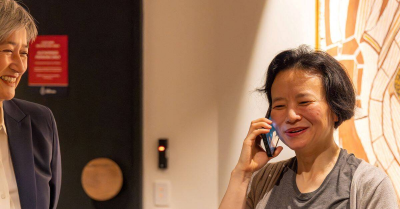Reuters-Release of journalist unlikely to shift Australias China policy
October 12, 2023 4 min 801 words
这篇报道强调了澳大利亚释放在中国被关押三年的记者程蕾,虽然此举可能改善与中国的外交气氛,但分析师们普遍认为这不会改变澳大利亚在应对中国军事扩张方面的政策。这对澳大利亚与中国之间的关系来说是一个重要的时刻,尤其是在自2020年以来的贸易关系紧张局势下。 澳大利亚释放程蕾,对于澳大利亚总理访问中国来说似乎是一种外交手法。然而,文章明确指出澳大利亚仍然会采取政策以应对中国在台湾问题和南中国海的行为,以及与美国等盟友加强军事合作。这反映了澳大利亚的坚定,不会妥协国家安全和利益。 尽管政治对话已经恢复,中澳贸易限制也大部分解除,但两国关系进入了一个更具风险的阶段。澳大利亚继续在军事领域与盟友合作,这可能引发中国对其可靠性作为经济伙伴的质疑。然而,双方仍然在争取改善关系,这是积极的迹象。 最终,澳大利亚强调国家安全和多元化出口市场,以减少对中国市场的依赖,这表明他们不会轻易改变政策。总的来说,这篇报道突显了中澳关系的复杂性和澳大利亚政府在处理外交关系方面的坚决性。
The release of an Australian journalist after three years in a Chinese prison should improve the atmosphere for a visit by Australia's prime minister but won't shift its policies aimed at hedging against China's military build-up, analysts said.
Prime Minister Anthony Albanese said there was no deal struck to release journalist Cheng Lei, who arrived home on Wednesday.
However, Australian officials had raised Cheng's detention on national security charges as China pushed to lock in an official visit by Albanese this year, the first by an Australian leader since 2016.
Albanese confirmed he would visit Beijing after meeting Chinese Premier Li Qiang at a regional summit in Indonesia last month. A date has not been set.
The release of the business television anchor was "a sweetener for the Albanese visit", said senior fellow for East Asia at the Lowy Institute foreign policy think tank, Richard McGregor.
"China always engages in elaborate diplomatic table setting for visits like this," he said.
The visit will be a major step for relations between the trading partners that soured when Beijing placed restrictions on Australian exports in 2020, and detained Cheng, coinciding with an Australian call for an inquiry into the origins of COVID-19.
Asia Society Australia's Executive Director of Policy Richard Maude said there would be no "direct quid pro quo" for her release.
"It would be reasonable to expect China's diplomats to be dusting off their long list of asks of Australia. Among these are that Australia step back from participating in what Beijing regards as a U.S.-led effort to contain China," said Maude, who is leading a review of Australia's intelligence agencies, and is an adviser on a government shakeup of its defence force.
"This won't happen," he said.
Australia will continue to hedge against the risks posed by China's conduct, including its pressure on self-ruled Taiwan and aggression in the South China Sea, he said.
China has in recent weeks repeatedly said it poses no threat to Australia, coinciding with an uptick in Australian participation in military exercises with its allies, from amphibious drills in the Philippines to navy exercises with Japan, the U.S. and India off Australia's east coast, seen as a deterrent to any plan by China to attack Taiwan.
Australia has also said it plans a navy patrol with the Philippines in the South China Sea, where tension with China is rising.
While political dialogue is back on track, and most - but not all - Chinese restrictions on Australian exports lifted, China and Australia were entering a "riskier" phase of their relationship, McGregor said.
"This is all while Australia is full speed ahead with AUKUS, doing patrols in the West Philippines sea with Japan and the U.S., and continuing to build up the military camps in northern Australia," he said.
China has said the so-called AUKUS agreement between Australia, the United Kingdom and the United States on defence technology, announced in 2021, has raised doubts about Australia's reliability as an economic partner.
For Australia, stabilising relations with China plays well in Southeast Asia, where leaders are concerned about tensions, McGregor said.
It also helped China, facing economic problems and higher commodity prices, to mend relations with a major supplier of iron ore, coal, gas and wheat, he said.
Analysts said China was likely to push for a more liberal approach to foreign investment in Australia's emerging critical minerals industry, and for support to join a Pacific-wide trade pact.
But Australia is unlikely to shift on policies such as national security screening of foreign investment, and will still urge exporters to diversify markets to reduce reliance on its biggest customer.
"There are areas where we will disagree, there are areas where we will cooperate," Foreign Minister Penny Wong told reporters, adding that Cheng's release showed the upside of the government push to stabilise ties with China since it was elected in 2022.
"You've seen some of the benefits of engagement."
A former trade minister, Craig Emerson, who led an Australian delegation at talks in Beijing last month, said both sides were reaching out to each other.
"There hasn't been any provocative language from either side for a considerable period of time and that provides the ballast for warming in the relationship," Emerson said.
Scott Morrison, prime minister when ties deteriorated in 2020, said in a speech in Taipei that Beijing hadn't walked away from its grievances with Australia, including "laws about foreign investment, espionage and national security".
"While their removal of some illegal trade sanctions is welcome, this is something that should be expected, not commended, and certainly not haggled for," he said.

